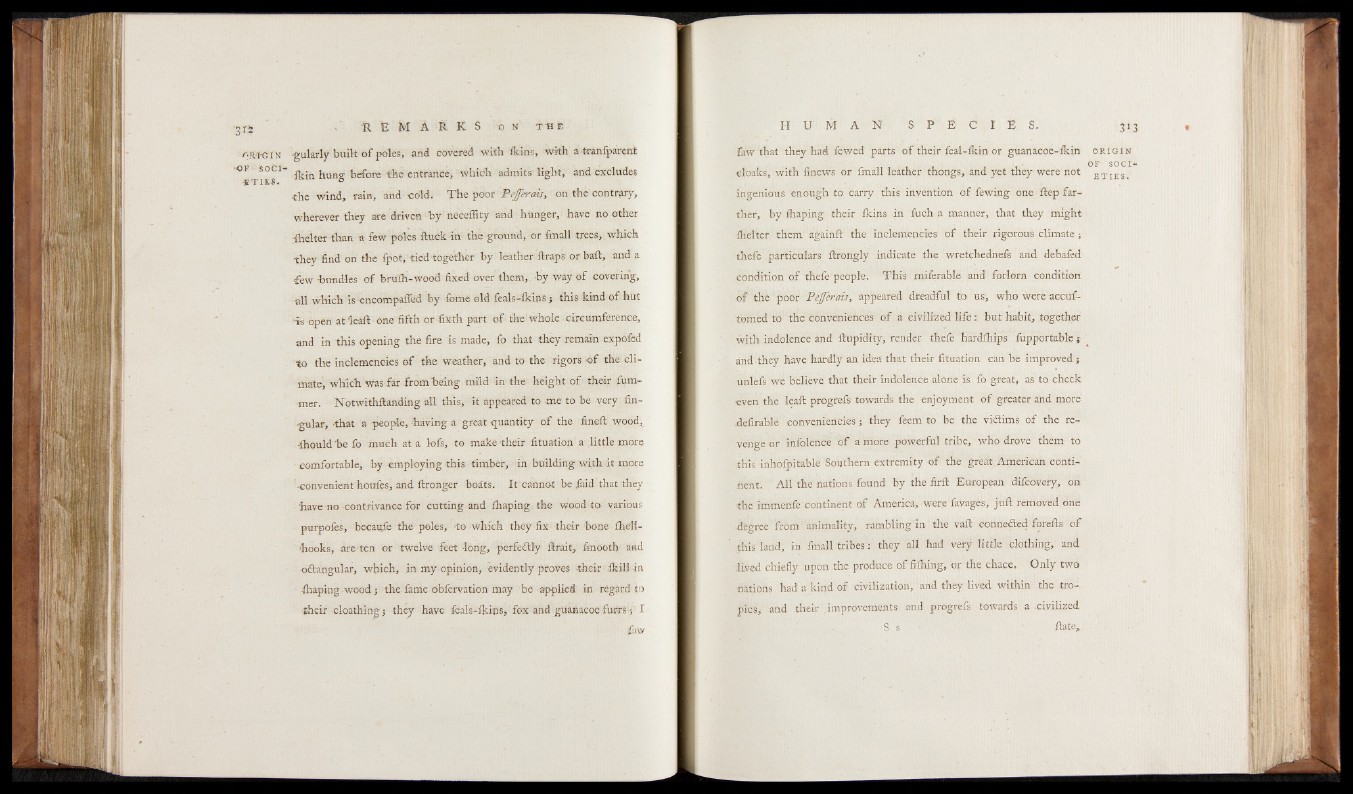
/'•R'KJiN ‘gularly built o f poles, and covered with fkins, with a tranlparent
o f s o c i - ^ before the entrance, which admits light, and excludes
STIES-. °
the wind, fain, and cold. Th e poof PeJJ'erm, on the contrary,
wherever they ate driven h y neceflity and hunger, have no other
-fhelter than a few poles ftuek in the ground, or final! trees, which
•they find on the fpot, tied together by leather ftraps or baft, and a
few -bundles o f brufh-wood fixed over them, b y way of covering,
all which is encompafled by feme old feals-lkins j this kind of hut
■ is open at leaft one fifth or fixth part o f the whole circumference,
and in this opening the fire is made, fo that they remain expofed
to the inclemencies o f the weather, and to the rigors o f the climate,
which was far from being mild -in the height o f their fum-
■ mer. Notwithftanding all this, it appeared to-me to be very Angular,
-that a people, having a great quantity o f the fineft wood,
-fhould 'be fo much at a lofs, to make their fituation a little more
comfortable, by employing this timber, ‘in-building with it more
-convenient houfes, and ftronger boats. I t cannot be faid that they
have no -contrivance for cutting and fhaping. the wood to various
purpofes, becaufe the poles, to which they fix their bone fhe'li-
■ hooks, are ten or twelve feet -long, perfeftly ftrait, finobth and
-oftangular, which, in my opinion, evidently proves their ikill in
fhaping -wood j the fame obfervation may be applied in regard to
-their cloathingj they have feals-lkins, fox and guanacoe -fur-rs-; I
. faW
faw that they had fewed parts o f their feal-lkin or guanacoe-lkin
cloaks, with finews or fmall leather thongs, and yet they were not
ingenious enough to carry this invention o f fewing one ftep farther,
by fhaping their lkins in fuch a manner, that they might
fhelter them againft the inclemencies o f their rigorous climate;
thefe particulars ftrongly indicate the wretchednefs and debafed
condition o f thefe people. This .miferable and forlorn condition
o f the poor Pejftrais, appeared dreadful to us, who were accuf-
tomed to the conveniences o f a civilized l i fe : but habit, together
with indolence and ftupidity, render thefe hardfhips fupportable ;
and they have hardly an idea that their fituation can be improved;
unlefs we believe that their indolence alone is fo great, as to check
even the leaft progrefs towards the enjoyment o f greater and more
ftefirable conveniences j they feem to be the vidtims o f the revenge
or infolence o f a more powerful tribe, who drove them to
this inhofpitable Southern extremity o f the great.American continent.
A ll the nations found by the firft European difeovery, on
the immenfe continent o f America, were favages, juft removed one
.degree from animality, rambling in the vaft connected forefts of
this land, in fmall tribes: they all had very little clothing, and
lived chiefly upon the produce of fiihing, or the chace. Only two
nations had a kind of civilization, and they lived within the tropics,
and their improvements and progrefs towards a .civilized
S s ftate,
O R IGIN
OF SOCI E
T IE S ;